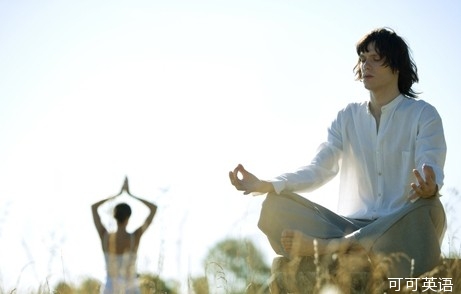(单词翻译:单击)

The Claim: Qigong, a Chinese health practice based on gentle movements, meditation and breathing, has wide-ranging benefits, including improving balance, lowering blood pressure and even easing depression.
主张:气功,中国的一种健身运动,动作轻柔,注重冥想和吐纳,功效广泛,比如改善身体协调能力,降血压,甚至还有缓解抑郁的功能。
The Verdict: Increasingly popular in the U.S., qigong (pronounced chee-gong) has been found in recent studies to improve quality of life in cancer patients and fight depression. Other studies have found improvements in balance and blood pressure. But so far, there aren't enough large, well-designed studies to constitute solid proof of any benefits, scientists say.
定论 :气功在美国越来越流行,近来不断有研究发现,气功能够改善癌症患者的生活质量,抗击抑郁。还有研究发现气功能改善身体协调能力、降低血压。不过科学家说,迄今为止,尚没有规模足够大、设计足够严密的研究来可靠地证实气功的任何益处。
Qigong, with its roots in traditional Chinese medicine, is a close cousin to the better-known tai chi. Unlike that practice, qigong isn't based in martial arts. Instead, it uses a variety of gentle movements, says Stanwood Chang, who teaches qigong classes at the Benson-Henry Institute for Mind Body Medicine at Massachusetts General Hospital in Boston. Because its motions are simple and repetitive, qigong is more accessible to many people than tai chi, which has long sequences that need to be memorized, Mr. Chang adds.
气功的理论基础在中医学,与更为知名的“太极”关系密切。与太极不同的是,气功并不以武术为基础。相反,波士顿麻省总医院(Massachusetts General Hospital)本森-亨利身心医学研究所(Benson—Henry Institute for Mind Body Medicine)教授气功课程的Stanwood Chang说,气功运用的是一系列舒缓的动作。他还补充说,因为动作简单,多有重复,气功比太极更适合多数人修习,太极套路很长,需要记忆。
Traditionally, qigong is described as a practice that cultivates 'qi, ' or life energy. Qi can't be measured objectively, says Shin Lin, a professor of cell biology at the University of California, Irvine. But his studies of qigong and tai chi practitioners have found a boost in both alpha brain waves, suggesting relaxation, and beta waves, indicating strong focus. 'It has the dual benefit of relaxing you, but also sharpening your mind, ' says Dr. Lin.
从传统上来说,气功是一种聚“气”(或曰生命的能量)的功法。加州大学欧文分校(University of California, Irvine)的细胞生物学教授林欣说,气无法客观地观测到。但他通过对气功和太极修习者进行研究发现,气功不但能提振脑α波(表明放松),还能提振脑β波(表明专注)。林欣说,它有双重功效,既能让你放松,还能增强脑力。
Some studies have found improvement in balance from qigong. At least one cites the fact that participants are taught to take a wider, more stable stance when standing.
有些研究已经发现气功能改善身体协调能力。至少有一项研究引述了这样一个事实:气功修习者被教导在站着的时候要采取双脚距离更大、更稳定的站姿。
Earlier this year, a three-month, 14-person study of depressed Chinese-Americans, who were offered one-hour qigong classes twice a week and encouraged to practice at home, found that 60% of those who took at least 15 classes saw a significant improvement in depression based on a standard rating scale. 'One theory is that qigong helps people to relax and combat stress, ' which tends to aggravate depression, says study co-author Albert Yeung, associate professor of psychiatry at Harvard Medical School in Cambridge.
今年早些时候,14名情绪抑郁的美籍华人参加了一项为期三个月的研究项目,这些人每周上两次气功课,每次一个小时,并且他们被鼓励在家也进行气功练习。研究发现,那些上了至少15次课的人当中,60%的人的抑郁情形有显著改善(按照标准等级衡量)。这项研究的共同作者、剑桥市哈佛大学医学院(Harvard Medical School)的精神病学助理教授Albert Yeung说,一个理论是,气功能帮助人们放松,对抗压力,而压力往往会加重抑郁。
The study was too small to be conclusive, adds Dr. Yeung, a senior consultant at the Benson-Henry Institute. But he's excited enough about the potential that he already recommends qigong to patients with mild and moderate depression, and in combination with medication to patients with severe depression.
Albert Yeung也是本森-亨利身心医学研究所的资深顾问。他说,这项研究的规模也是太小,得出的结论也不具有决定性。但他对结果感到很兴奋,他已经向中度和轻度抑郁患者推荐气功疗法,并建议重度抑郁患者可以在服用药物的同时练习气功。
For cancer patients, qigong can be done sitting and lying down if a person has physical constraints or is in pain, says Yang Yang, a kinesiologist and researcher, who teaches qigong at Memorial Sloan-Kettering Cancer Center in New York.
人体运动学专家、研究人员杨洋(音)说,对于癌症患者来说,如果患者身体方面存在局限,或是剧烈疼痛,可以采用坐姿或卧姿练习气功。杨洋在纽约的斯隆-凯特琳癌症中心(Memorial Sloan-Kettering Cancer Center)教授气功。
In a study of 96 women getting radiation therapy for breast cancer, published earlier this year, a team of Chinese scientists and researchers at the University of Texas MD Anderson Cancer Center in Houston found reduced depression in women who took five weekly classes of qigong, compared with a control group that didn't take the classes. Among those depressed at the start of the trial, fatigue was lessened and overall quality of life improved.
在今年早些时候发表的一项研究针对96名因乳腺癌接受放射治疗的女性。休斯敦的得克萨斯大学(University of Texas)安德森癌症中心(MD Anderson Cancer Center)的一组中国科学家和研究人员发现,每周上气功课上了五周的女性患者相比没有上气功课的对照组患者来说,抑郁程度有所减轻。在那些试验伊始就有抑郁症状的病人当中,疲劳程度有所减轻,整体生活质量得到改善。
Many people take qigong group classes, which typically cost $10 to $20 an hour, or practice at home after learning the exercises in a class or from a qigong DVD or online video.
很多人参加集体气功课程,费用一般在每小时10美元到20美元之间,或是在课上学了之后回家接着练习,也有人跟着气功DVD或在线视频学习气功。


